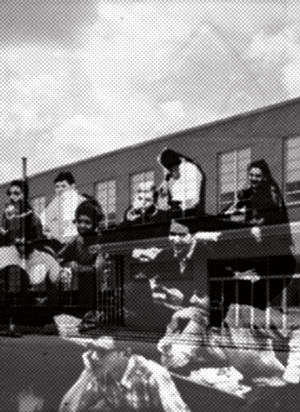Page 1 Page 2 Page 3 Page 4 Page 5 Page 6
“Stuart, you tell me: Are you gonna give up something if you don’t have to? Are you truly ready to accept blacks as your equals? How close do you want to be to us? If I come to your house tomorrow and say, ‘I’m taking your Beatles LPs, Stones singles, and just to wrap things up, your pretty little blond sister carries the records, and we won’t be back for a week or two, what are you gonna do?”
“I might fight you for the records.”
“Very funny, Mr. Magoo. You get my point, though: Maybe you are all well and good for me and my brothers voting without out-running lynch mobs, getting union cards, going to good schools…”
“We’re in the same school.”
“Your choice. And once you’re done here, and duck the draft and get your B.A., or more, you stand a much better shot at a good job than I do even if I have the same education…or more, for that matter.”
“Agreed: The question, Walter, is really this: With non-violence, King, the NAACP…”
“Some say, for Oreos only.”
“Maybe. But just the same, cut through the, what, rhetoric, how do you win with violence? Doesn’t the government, the police, the military…don’t they have more tough guys with guns? Forget whether it’s right…whether innocent people get killed in all these riots…it can’t really work, can it?”
A hard-hit baseball shot past us. Walter—rare for him—ducked.
“Work how, Stuart? Literally overthrow the government? Not likely. But if we’re gonna go, maybe we take a few of you with us. Kill a few white people and the rest of you won’t want to die, so maybe things would change a little more quickly, than just from singing ‘We Shall Overcome.’ ”
Where, I wondered, did that leave me, if I had to be sacrificed to grease the wheels of progress? I couldn’t see where I had anything to do with any of these inequities he was complaining about.
My cocoon from the mean new world was starting to sever.
It tore wide open in 1968. The first rip in my What-Me-Worry? walls came the last day of March, when President Johnson announced unexpectedly that he wasn’t running for re-election. This seemed a good sign until the next day at lunch when Walter located the cloud behind that silver lining: “We’ll just have another butcher in there after Johnson.”
I argued that Robert F. Kennedy, brother of the slain JFK, was promising—“Bobby wants to stop the war”—but Walter was unmoved.
“Even if he wins, do you think the war machine, the weapons manufacturers, Congress, do you think all those bigots are gonna turn off the blood spigot?”
“Does everything have to come down to race? Aren’t white kids getting gunned down in ‘Nam?”
“Some rednecks, sure,” Walter said as he polished off a soft pretzel. “But it’s mostly blacks, poor blacks, cannon fodder. Racists run the war machine.”
Convinced that, since I wasn’t any kind of bigot, society’s ills and evils had nothing to do with me, I shook off the grim stuff for the next couple of days, eating cheese crackers and taking in the mini-skirts taunting my hungry eyes.
All of which was shoved aside that Thursday, April 4, when Dr. King’s murder in Memphis set off riots in major cities and sent a spring chill up my scrawny back as I made my way to school the next day.


